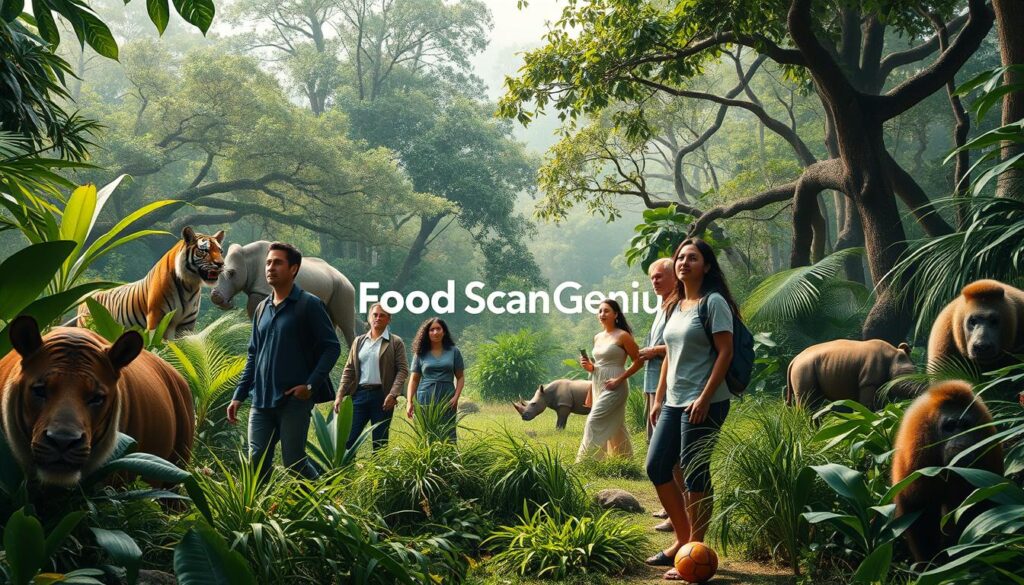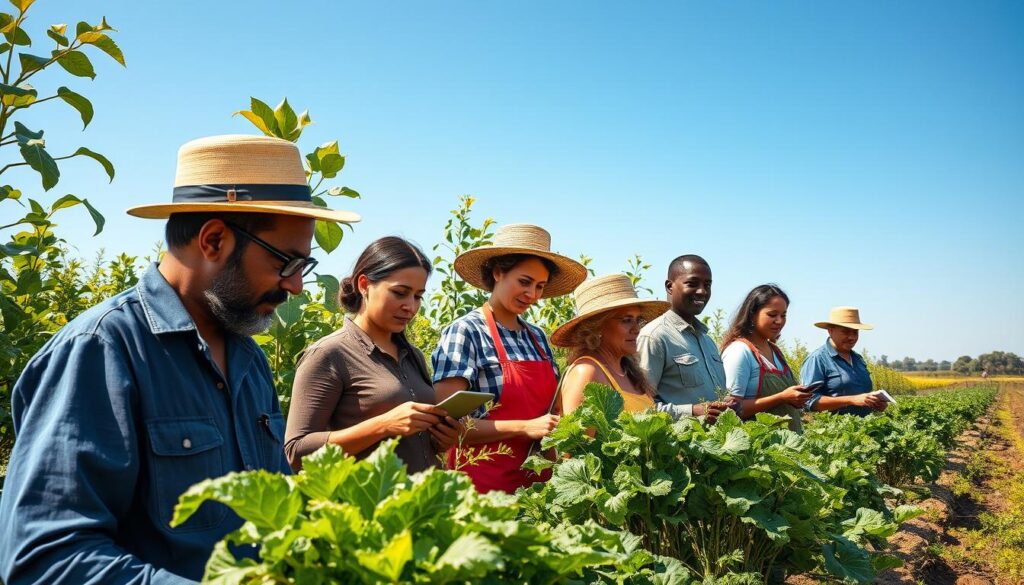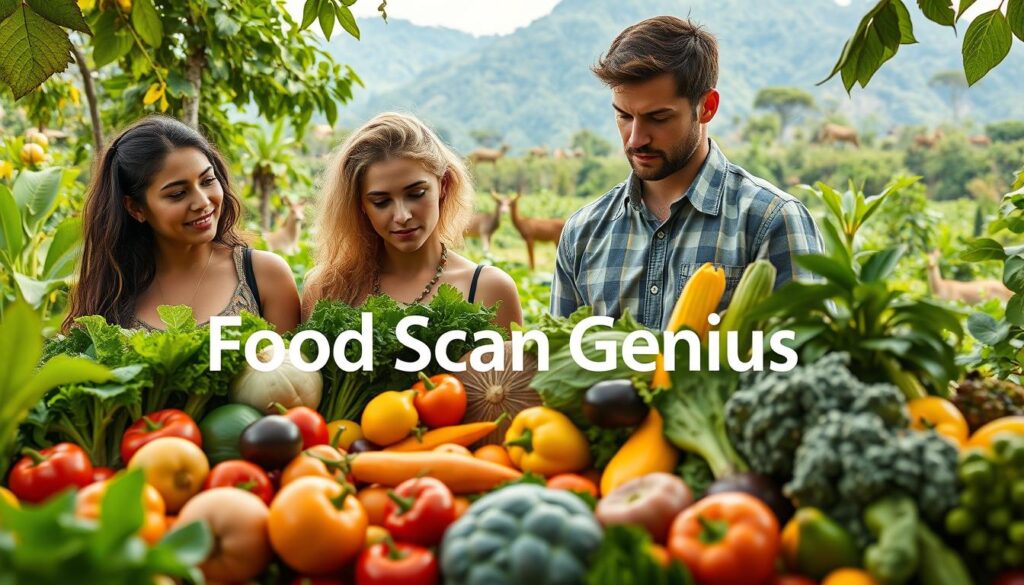Hey there, eco-warriors! 🌿 Let’s explore how our food choices can change the world! A study in the UK showed vegan diets cut down on climate-heating emissions, water pollution, and land use by 75% compared to diets full of meat1. They also reduce wildlife destruction by 66% and water use by 54%1! It’s amazing!
The global food system is a big problem, causing a third of greenhouse gas emissions, using 70% of freshwater, and polluting 80% of rivers and lakes2. But, good news! Eating plant-based can lower your carbon footprint by up to 60%3! Our Food Scan Genius app makes choosing eco-friendly food easy. Let’s save the planet, one vegan meal at a time! 🌎🥑
Key Takeaways
- Vegan diets can reduce greenhouse gas emissions, water pollution, and land use by up to 75%.
- The global food system is responsible for a significant portion of total greenhouse gas emissions and freshwater usage.
- Switching to a plant-based diet can cut your carbon footprint by up to 60%.
- Food Scan Genius app makes it easy to choose sustainable, eco-friendly food options.
- Vegan diets can also help preserve wildlife and biodiversity.
Understanding Veganism and Its Principles
Veganism is more than just what we eat. It’s a way of life that focuses on kindness, caring for the planet, and feeling good ourselves. At its heart, veganism means avoiding animal products and choosing plant-based options4. Vegans also avoid using leather, fur, and other animal products, choosing eco-friendly alternatives instead4.
What is Veganism?
Veganism is a choice to avoid animal products. This means no meat, dairy, eggs, or anything animal-derived5. It’s about reducing animal suffering, protecting the environment, and improving our health4. Vegans often choose organic, local, and vegan-friendly foods and products4.
Core Principles of a Vegan Lifestyle
Veganism is built on three main values: kindness to animals, caring for the planet, and health4. Vegans make choices that avoid animal exploitation and support their values4. They also know that animal farming harms the environment and try to reduce their carbon footprint with plant-based diets6. Plus, vegan diets can lead to better health, like a lower weight and less risk of diseases4.
Even small changes can make a big difference. Adding more plant-based foods or choosing cruelty-free products helps5. And if you’re new to veganism, our Food Scan Genius app can guide you5!
Adopting a vegan diet can reduce the risk of developing coronary heart disease, diabetes, and various types of cancer.” – American Heart Association
| Vegan Diet | Non-Vegan Diet |
|---|---|
| Lower body weight and BMI4 | Higher body weight and BMI4 |
| Reduced risk of chronic diseases4 | Increased risk of chronic diseases4 |
| Improved gut health and digestion4 | Poorer gut health and digestion4 |
| Lower cholesterol levels4 | Higher cholesterol levels4 |
By living vegan, we can improve our health and help the planet. Let’s explore plant-based living together5!
The Climate Crisis and Agriculture
Get ready, eco-warriors, for a shocking truth about agriculture and the climate crisis. Animal agriculture is to blame for 16.5% of global greenhouse gas emissions7. Cows and sheep are the main culprits, thanks to their methane production. In fact, eating meat is 93% worse for the environment than eating vegan7.
How Agriculture Contributes to Climate Change
But there’s more. Animal agriculture is also causing deforestation, especially in the Amazon Rainforest. About 90% of deforestation there is linked to red meat production7. Food systems are responsible for a third of emissions and 70% of freshwater use7. Our food choices really affect the planet.
The Role of Livestock in Greenhouse Gas Emissions
The UN Food and Agriculture Organization says animal agriculture is responsible for 11% of global greenhouse gases. But research suggests it could be up to 20%7. A study found stopping animal agriculture for 15 years could cut carbon dioxide emissions by 68% by 21008.
Eliminating animal agriculture could greatly reduce methane and nitrous oxide emissions. It could also help convert CO2 back into biomass8.
Changing our food choices can make a big difference. Our Food Scan Genius app makes it easy to choose climate-friendly foods. Let’s cool down our planet, one bite at a time! 🌱
“A global shift to plant-based diets by eliminating animal agriculture would provide 52% of the net emission reductions necessary to limit global warming to 2 degrees Celsius above preindustrial levels.”8
| Dietary Approach | Greenhouse Gas Emissions Reduction |
|---|---|
| Vegan | 40% less than vegetarian, 60% less than pescatarian, 70% less than omnivore7 |
| Vegetarian | 60% less than omnivore7 |
| Pescatarian | 40% less than omnivore7 |
| Omnivore | Baseline |
Our food choices have a huge impact on the planet. But with the right info and tools, we can all make a difference. Let’s fight climate change together, one delicious, sustainable meal at a time789.
Direct Environmental Benefits of Veganism
Ready to make a big difference? Switching to vegan can have a huge positive impact on the environment. Your carbon footprint could drop by up to 60%10. That’s like taking a huge step for the planet.
And the water savings? Mind-blowing! Vegan diets can cut water usage by 54%10. It’s like being a water-saving superhero.
The real game-changer is preserving biodiversity. Vegan diets can reduce wildlife destruction by 66%10. This is like protecting the future of all animals. Plus, if we all went half-vegan, we could cut agricultural emissions by 31% by 205011. This also boosts food security, making it a win-win!
| Environmental Impact | Reduction with Vegan Diet |
|---|---|
| Carbon Footprint | Up to 60%10 |
| Water Usage | 54%10 |
| Biodiversity Loss | 66%10 |
| Agricultural Emissions | 31% by 205011 |
You don’t have to do it alone. Our Food Scan Genius app can help you on your eco-friendly food journey. Together, we can make a big difference for our planet!
“Globally replacing 50% of animal-sourced foods with plant-based alternatives would reduce agricultural and land-based emissions by 31% by 2050 while increasing food security.”11
So, what are you waiting for? Let’s be the heroes our planet needs, one vegan bite at a time. Vegan on, my friends!
Resource Consumption: A Comparison
Being eco-conscious means understanding the big difference between animal farming and plant-based farming. Let’s look at the numbers and see why you might change your shopping habits12.
Land Use for Animal Farming vs. Plant Farming
Animal agriculture takes up 77% of all agricultural lands12. That’s a huge chunk of space. On the other hand, plants like wheat, bananas, and potatoes only use a small part of the land, giving us 18% of the world’s calories13. Switching to plant-based foods could greatly reduce our land use and help our planet.
Water Needs for Meat vs. Plants
Water usage is even more shocking. It takes 1,847 gallons of water to produce one pound of beef, but only 39 gallons for vegetables13. If we all ate more plants, we could save a huge amount of water, up to one million liters per person per year13. This is a big win for our water resources.
Plant-based meat alternatives are also better for the environment, with a 50% lower impact than traditional meat12. The Food Scan Genius app makes choosing these options easy. Let’s help our planet by choosing plants over animals!
| Resource Consumption | Animal Farming | Plant Farming |
|---|---|---|
| Land Use | 77% of agricultural lands | 18% of the world’s calories |
| Water Consumption | 1,847 gallons per pound of beef | 39 gallons per pound of vegetables |
| Environmental Impact | Contributes to 12-20% of human-induced greenhouse gas emissions | 50% lower impact than traditional meat products |
The facts are clear: plant-based farming is better for our future. Apps like Food Scan Genius make it easy to choose eco-friendly options. Let’s protect our planet, one meal at a time1213.
The Importance of Sustainable Food Choices
We all have the power to make a big difference with our food choices. Eating sustainably is not just good for us, but also for our planet. Veganism shows us how we can lessen our environmental impact by what we eat.
The Concept of Sustainable Eating
Sustainable eating means picking foods that don’t harm the environment. We should choose plant-based, locally-sourced, and organic foods whenever we can14. This helps us use less water, cut down on greenhouse gases, and protect the land.
Veganism as a Solution to Food Waste
Sustainable eating is not just about how food is made. It’s also about cutting down on food waste, and veganism helps a lot with this1516. Plant-based diets waste less because we use more of the food we buy. The Food Scan Genius app makes it easy to find sustainable and ethical food choices, helping us reduce our environmental impact.
Together, we can make our food system more sustainable and our planet healthier. By supporting sustainable agriculture and ethical consumerism, we feed our bodies and care for our world. Let’s start making a difference, one delicious, eco-friendly meal at a time!
“A plant-based diet can reduce greenhouse gas emissions from food by up to 73%, with additional benefits in addressing acidifying and eutrophying emissions.”15
Examining Nutritional Aspects
Plant-based diets offer many health benefits but need some extra care. Vegans and vegetarians often face lower risks of diseases like type 2 diabetes and heart disease17. However, there are a few nutrients that require special attention.
Key Nutrients in a Vegan Diet
Protein, vitamin B12, iron, and omega-3s are key nutrients for vegans18. Vegans tend to eat less protein, which can lead to deficiencies18. But, you can get enough protein from beans, lentils, nuts, and soy products.
Overcoming Nutritional Deficiencies
Vitamin B12 is hard to get from plants, as it’s mainly in animal products18. Low B12 levels can cause serious health issues. So, it’s crucial to eat B12-fortified foods or take supplements18. Iron and zinc from plants can also be tricky, but our Food Scan Genius app helps track these nutrients.
While plant-based diets have their challenges, the benefits are worth it. With a little planning and the help of apps like Food Scan Genius, you can meet all your nutritional needs. Enjoying a healthy body and a green planet is the ultimate reward.
The Role of Plant-Based Diets in Wildlife Conservation
Our food choices greatly affect the planet and its creatures. By choosing plant-based diets, we help protect endangered species and preserve biodiversity worldwide19.
Impact on Endangered Species
Animal agriculture leads to habitat loss, harming many species. In fact, 86% of threatened species face danger from agriculture20. By eating less meat and more plants, we can help save their homes20.
Habitat Preservation through Reduced Farming
Animal farming has a huge environmental impact20. It uses over 80% of global farmland but only gives us 18% of our food calories20. Switching to plants can free up land for nature, helping biodiversity20.

Also, turning pastures back into forests could store 72 billion tonnes of carbon. This is like seven years of carbon emissions from fossil fuels20. It helps endangered species and fights climate change20.
By choosing plant-based meals, we’re reducing the demand for animal agriculture, which is a major cause of habitat destruction. Our food choices can help save endangered species and preserve precious natural habitats.
Plant-based diets are a key part of sustainable living for wildlife. Together, we can protect our planet’s ecosystems and ensure a better future for all.
Misconceptions About Veganism
There are many wrong ideas about plant-based diets. But don’t worry, we’re here to clear things up! Let’s tackle some common vegan myths21.
Myth: Vegan Diets are Nutritionally Incomplete
No, vegan diets can give you all the nutrients you need. In fact, they might even lower your risk of heart disease and some cancers21. So, you won’t miss out on important vitamins and minerals.
Myth: Vegan Eating is Expensive and Time-Consuming
This myth is easily debunked. Affordable and quick vegan staples like beans, lentils, and rice are easy to find22. With more vegan options available, it’s easier than ever to eat well. The Food Scan Genius app helps you find healthy, budget-friendly vegan food at your local store.
Myth: You Have to Go 100% Vegan to Make a Difference
Not true! Even a little less animal product can help the environment22. Every bit counts in ethical consumerism. So, you don’t have to go all-in to make a difference.
Remember, vegan diets don’t have to be boring. Vegan food offers a wide range of tasty and fulfilling options23. With the right tools, like the Food Scan Genius app, switching to a plant-based lifestyle is easier than ever.
“Vegan diets are not restrictive or nutritionally lacking, with plant-based athletes exemplifying the strength and health benefits of a vegan lifestyle.”21
Let’s move past these misconceptions and enjoy the tasty world of plant-based eating. Your body, the planet, and your taste buds will all benefit!
Case Studies: Countries Adopting Vegan Policies
More countries are focusing on the environmental effects of our food choices. They are moving towards plant-based living. Let’s look at some vegan efforts in Europe and the United States.
Vegan Initiatives Across Europe
In the Netherlands, the government aims to lead in plant-based protein production24. Portugal has made vegan options a must in public canteens25. This makes it easier for everyone to eat plant-based.
Success Stories from the U.S.
In the United States, cities are also joining the vegan movement. New York City and Los Angeles have Meatless Mondays in schools25. The New York City Council aims to cut down on food-related emissions24.
These efforts show that governments can encourage eco-friendly eating. We can all help by making better food choices. Our Food Scan Genius app guides you in choosing sustainable food.

By choosing plant-based options and supporting sustainable food policies, we can help our planet. Let’s follow the lead of these countries and cities in making a difference.
Transitioning to a Vegan Diet
Ready to try plant-based eating? We’ve got your back! Start slow, as Harvard expert Walter Willett advises. You don’t need to go all vegan right away to help26.
Begin with Meatless Mondays or swap one animal product at a time. Maybe try plant-based milk in your coffee? Small steps can make a big difference26.
Tips for Beginners
Get creative in the kitchen! Try new recipes and ingredients. You might find a new favorite food. And remember, eat a variety of fruits, veggies, whole grains, legumes, nuts, and seeds27.
Need help? Our Food Scan Genius app is here for you! It’s like having a vegan nutritionist in your pocket.
Gradual Changes to Reduce Environmental Impact
Every plant-based meal helps the planet26. Whether you go vegan or just eat less meat, you’re making a difference28. Meat, especially from lamb and beef, produces a lot of greenhouse gases compared to plants28.
Let’s enjoy this journey together, one tasty plant-based meal at a time!
“Eating plant-based can be a delicious, healthful, sustainable, and compassionate way of eating.”
The Future of Veganism and Environmentalism
The future of food is looking greener than ever. Plant-based eating is becoming a lasting movement. We’re seeing new products like burgers that “bleed” and dairy-free ice creams that taste amazing29. This change is not just about tasty food; it’s about saving our planet. As more people choose sustainable food, we’ll see new policies supporting plant-based farming29.
Trends in Plant-Based Eating
More people are choosing plant-based eating due to environmental and animal welfare concerns. Vegan diets are also known for their health benefits30. In the UK, vegan numbers jumped by 300% from 2014 to 2019, reaching 600,00031. In 2020, Veganuary helped cut greenhouse gas emissions like 160,000 cars31. This isn’t just a trend; it’s a movement changing our food future.
How Veganism Can Shape Sustainable Policies
As demand for plant-based food grows, we’ll see more support for sustainable farming. Imagine school lunches and food labels that help the planet. This isn’t just a dream; it’s a possible future we can build together29. Choosing plant-based options means supporting a greener food system. Apps like Food Scan Genius make these choices easier29. By embracing plant-based eating and backing sustainable policies, we can merge tasty food with environmental care.
FAQ
What is the environmental impact of veganism?
A study in the UK showed vegan diets cut down on pollution and land use by up to 75%. They also reduce wildlife harm by 66% and water use by 54%.
What are the core principles of a vegan lifestyle?
Veganism is about caring for animals, protecting the environment, and staying healthy. Vegans avoid animal products and choose plant-based foods.
How does animal agriculture contribute to climate change?
Animal farming causes 16.5% of global greenhouse gas emissions. Cows and sheep are big contributors because they produce methane. It also leads to deforestation.
What are the direct environmental benefits of a vegan diet?
Eating vegan can cut your carbon footprint by up to 60%. It also reduces water use by 54% and wildlife harm by 66%. This helps protect biodiversity.
How do plant-based diets compare to animal-based diets in terms of resource consumption?
Animal farming takes up 85% of UK land and pollutes water the most. Plant-based foods need less land, water, and produce fewer greenhouse gases.
What is the concept of sustainable eating, and how does veganism fit into it?
Sustainable eating means choosing foods that are good for us and the planet. Veganism is top-notch for sustainability. It lowers emissions, water use, and food waste.
Can a vegan diet meet all our nutritional needs?
Yes, with the right planning, vegan diets can cover all nutritional bases. They’re linked to lower risks of diseases like type 2 diabetes and heart disease.
How can plant-based diets help protect endangered species?
Vegan diets can cut wildlife harm by 66%. They help preserve habitats and reduce water pollution that harms aquatic species.
What are some common misconceptions about veganism?
Myths say vegan diets are bad for health, expensive, and require total commitment. But, vegan diets can be healthy, affordable, and even small changes help.
What vegan policies are being implemented around the world?
Countries like the Netherlands and Portugal are pushing for more plant-based eating. US cities are starting Meatless Mondays in schools.
How can someone start transitioning to a vegan diet?
Begin with small steps like Meatless Mondays or replacing one animal product at a time. Try new recipes and use apps like Food Scan Genius to track nutrients.
What is the future of veganism and environmental sustainability?
The future of food is greener, with more plant-based products and policies for sustainable farming. Every vegan meal supports a sustainable food system.
Source Links
- Vegan diet massively cuts environmental damage, study shows
- Vegans, vegetarians, fish-eaters and meat-eaters in the UK show discrepant environmental impacts – Nature Food
- A Vegan Diet: Eating for the Environment
- The Ethics of Veganism – PMC
- Veganism: Principles, Issues and Tips to Make it Sustainable
- What Is the Environmental Impact of Going Vegan?
- Vegan diets cause far less climate pollution, study shows. Here’s what to know in Tennessee.
- Could going vegan help reduce greenhouse gas emissions?
- What If the World Went Vegan? A Review of the Impact on Natural Resources, Climate Change, and Economies
- Going Vegan Reduces Your Environmental Impact – Vegan Outreach
- Going Vegan: Is It Good For The Earth – THRIVE Project
- Meat substitutes: Resource demands and environmental footprints
- How Vegan and Plant-Based Eating Can Help The Environment
- Why Is a Plant-Based or Vegan Diet More Sustainable? — Sustainable Rookie
- Position of the Society for Nutrition Education and Behavior: The Importance of Including Environmental Sustainability in Dietary Guidance
- Plant-based eating for a more sustainable future
- Plant-Based Diets: Considerations for Environmental Impact, Protein Quality, and Exercise Performance
- The Impact of a Vegan Diet on Many Aspects of Health: The Overlooked Side of Veganism
- Exploring Benefits and Barriers of Plant-Based Diets: Health, Environmental Impact, Food Accessibility and Acceptability
- Plant-based diets crucial to saving global wildlife, says report
- 30 Common Misconceptions About Veganism Debunked
- Truths and Myths of being vegan
- Debunking Veganism Myths and Misinformation
- If the world adopted a plant-based diet, we would reduce global agricultural land use from 4 to 1 billion hectares
- Vegetarian and vegan diets
- Embracing a plant-based diet
- Health Benefits of a Vegan Diet
- Environmental vegetarianism
- The climate benefits of veganism and vegetarianism
- Vegan Environmental Impact: The Effects of a Vegan Diet
- Is a vegan diet better for the environment?






1 Comment
[…] winemaking is good for the planet. It uses organic and biodynamic farming. This helps biodiversity, cuts down on chemicals, and makes ecosystems healthier. So, choosing natural wine is a green […]